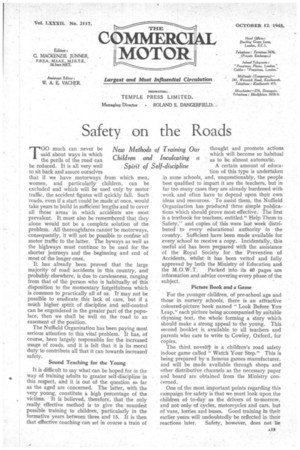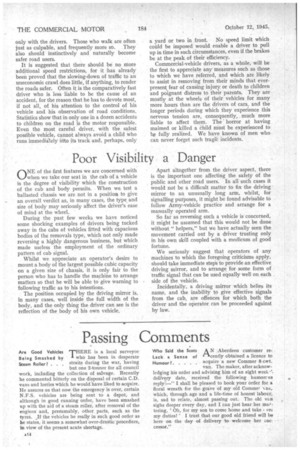Safety on the Roads
Page 15

Page 16

If you've noticed an error in this article please click here to report it so we can fix it.
T00 much can never be said about ways in which the perils of the road can be reduced. It is all very well to sit back and assure ourselves that if we have motorways from which men, women, and particularly children, can be excluded and which will be used only by motor traffic, the accident figures will quickly fall. Such roads, even if a start could be made at once, would take years to build in sufficient lengths and to cover all those areas in which accidents are most prevalent. It must also be remembered that they alone would not be a complete solution of the problem. All thoroughfares cannot be motorways, consequently, it will not be possible to confine all motor traffic to the latter. The byways as well as the highways must continue to be used for the shorter journeys and the beginning and end of most of the longer ones., It has already been proved that the large majority of road accidents in this country, and probably elsewhere, is due to carelessness, ranging from that of the person who is habitually of this disposition to the momentary forgetfulness which is common to practically all of us. It may not be possible to eradicate this lack of care, but if a much higher spirit of discipline and self-control can be engendered in the greater part of the populace, then we shall be well on the road to an easement of the position.
The Nuffield Organization has been paying most serious attention to this vital problem. It has, of course, been largely responsible for the increased usage of roads, and it is felt that it is its moral duty to contribute all that it can towards increased safety.
Sound Teaching for the Young . It is difficult to say what can be hoped for in the way of training adults to greater self-discipline in this respect, and it is out of the question so far as the aged are concerned. The latter, with the very young, constitute a high percentage of the victims. It is believed, therefore, that the only really, effective method is to give the soundest possible training to children, particularly in the formative years between three and 15. It is then that effective coaching can set in course a train of New Methods of Training Our thought and promote actions Children and Inculcating a as to be almost automatic.
Spirit of Self-discipline A certain amount of educa tion of this type is undertaken in some schools, and, unquestionably, the people best qualified to impart it are the teachers, but in far too many cases they are already burdened with work and often have to depend upon their own ideas and resources. To assist them, the Nuffield Organization has produced three simple publications which should prove most effective. The first is a textbook for teachers, entitled" Help Them to Safety," and copies of this were last week distributed to every educational authority in the country. Sufficient have been made available for every school to receive a copy. Incidentally, this useful aid has been prepared with the assistance of the Royal Society for the Prevention of Accidents, whilst it has been vetted and fully approved by both the Ministry of Education and the M.O.W.T. Packed into its 40 pages are information and advice covering every phase of the subject.
Picture Book and a Game For the younger children, of pre-school age and those in nursery schools, there is an attractive coloured-picture book named "Look Before You Leap," each picture being accompanied by suitable rhyming text, the whole forming a story which should make a strong appeal to the young. This second booklet is available to all teachers and parents who care to write to Cowley, Oxford, for copies.
The third novelty' is a children's road safety indoor game called " Watch Your Step." This is being prepared by -a famous games manufacturer, and will be made available through shops and other distributive channels as the necessary paper and board are obtained from the Ministry concerned.
One of the most important points regarding this campaign for safety is that we must look upon the children of to-day as the drivers of to-morrow, and not only of cycles, motorcycles and cars, but of vans, lorries and buses. Good training lu their earlier years will undoubtedly be reflected in their reactions later. Safety, however, does not lie only with the drivers. Those who walk are often just as culpable, and frequently more so. They also should instinctively and naturally become safer road users.
It is suggested that there should be no more additional speed restrictions, for it has already been proved that the slowing-down of traffic to an uneconomic crawl does little, if anything, to render the roads safer. Often it is the comparatively fast driver who is less liable to be the cause of an accident, for the reason that he has to devote most, if not all, of his attention to the control of his vehicle and his observation of road conditions. Statistics show that in only one in a dozen accidents to children on the road is the motor responsible. Even the most careful driver, with the safest possible vehicle, cannot always avoid a child who runs immedialely into its track and, perhaps, only a yard or two in front. No speed limit which could be imposed would enable a driver to pull up in time in such circumstances, even if the brakes be at the peak. of their efficiency.
Commercial-vehicle drivers, as a whole, will be the first to appreciate any measures such as those to which we have referred, and which are likely to assist in removing from their minds that everpresent fear of causing injury or death to children and poignant distress to their parents. They are mostly at the wheels of their vehicles for many more hours than are the drivers of cars, and the longer periods during which they experience this nervous tension are, consequently, much more liable to affect them. The horror at having maimed or killed a child must be experienced to fully realized. We have known of men who can never forget such tragic incidents.




















































